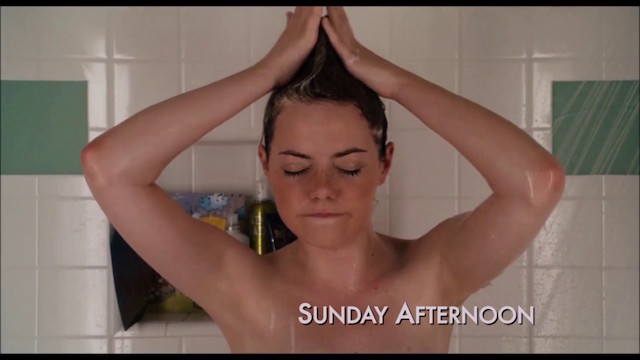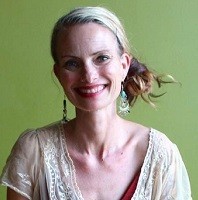Somewhere between cinnamon toast, lost rain jackets, and sibling rivalry over who gets to pick the next morning cartoon, I sing my morning chants.
My practice is mindful and holy.
I drag the sweater off my body and yank it hard when I feel the clump of yesterday’s wadded up bun caught on a button.
It’s as if pulling harder will make it easier.
I stop and find Mountain Pose. Then, I lift my leg up at the knee to peel my wool long johns off my foot. I come into my breath and pause. I have a flash of a Buddhist nun taking off her robes, folding them neatly as the words “how you do one thing is how you do everything” flash through my mind.
Then I notice the thoughts I’ve been thinking:
You will never get it together. Look at you. You haven’t grown at all.
I walk to the shower and turn on the hot water.
I step in and drop my attention out of the hostile terrain of my head to the bottom of my heart and hold something tender and aching within me. I feel it first, like the sliver of the moon beneath my sternum.
Only then do I open my mouth. I lift the inner arches of my feet and sense my breath being drawn up from the earth through the white ceramic tile. I draw up on my thighs and meet my belly on my exhale as I draw my navel back and in toward my spine.
The Om takes me into my solar plexus, the place of that tender, achy child inside me. I let her have my voice and for the next several minutes, I am singing in the shower.
By the time I walk the kids to school I feel open and spacious. We enjoy each other. We laugh.
I connect to them because I have connected to myself.
The alchemical elixir of awareness and song has soothed my jagged nerves, providing me with enough patience to tolerate novice shoe tying with five minutes on the clock before the tardy bell rings.
How is it that this medicine of song isn’t taken more often?
I suspect at some point we became self-conscious. Maybe a parent told us we sounded bad, or we had an aunt who shamed us for being too full of ourselves anytime we performed for fun.
You might reflect right now on what the story about your song has been.
Maybe you believe what I used to believe: “I can’t sing. My voice is bad, and if I let it out I will feel shamed and unloved.” It’s important we get clear on what the belief is. Likely, this belief has been limiting us in other areas of our lives.
I’ll share a story with you as an example:
One year for Christmas I got a tape recorder. It came with three tapes by Olivia Newton John, my childhood idol.
The words weren’t important to me. What mattered was how good it felt to let my voice out.
When I sang back then, I would lose time. I spent hours in my room listening to tapes and recording my own versions of the songs I’d learned. Sometimes, there were other kids around, and I’d invite them to join me.
Singing transported me beyond myself.
My dad loved to sing too. He would croon deep and loud with the window rolled down in his white Datsun. He thought the chicks liked it—at least that’s what he told me. I only saw him every few weekends, so he didn’t know how much I liked to sing too.
One time, I let him hear me. I was in the shower in his bachelor pad. I don’t remember what the song was, but I remember being proud. I figured if I could show my dad that I too had talent, he would love me. I had belted out a good one and then dried off, got dressed, and made my way to the living room where he was standing by the sink in the kitchen.
“Did you hear me sing, Dad?”
“I did hon. Just because we think we have a good voice doesn’t mean we actually do.”
I never sang in front of anyone again for a long time after that.
As I look back on this with adult eyes, I realize my Dad was talking to himself.
But as a kid, I believed it was bad and scary to let my song be heard. So I became quiet.
I sense my tale of song may be similar to yours. Think about the last time you really sang. If it’s been awhile, what are the stories you tell yourself about why you don’t?
I used to have so much tension in my throat that when I was really upset, my voice could barely squeeze through. I’d sound like a small girl and, in fact, I came to realize that in those moments, I was. I was acting out of a tender, frightened, and needy part of myself.
With the help of my teachers and my mindfulness practice, I explored this contraction more deeply, sensing it contained within it something that was important for my growth and healing.
You’ve probably heard about how repressing feelings makes you sick. It takes a lot of energy to keep your inner world from your outer world. In time, this takes its toll on your physical body.
For years, I sat on my meditation cushion feeling the grip of challenging emotions that never went anywhere. The tension was familiar and stuck, like a zipper you just can’t open.
Vocal expression that provides for a wide range of emotive tones (like singing) can be a bridge from repression to integration. It’s not just about performance. You can sing for your own well-being. You can speak what’s true for no other reason than to be more fully seen and loved for who you are.
We have a voice. It is ours to express.
Let’s not let limiting notions, ideas, or beliefs stop us. We can do this by being more aware of the stories we tell ourselves. We shouldn’t argue with them, but we shouldn’t buy into them, either. Instead, we can choose to go through them.
We can also notice what comes up as we sing. Likely it will show us exactly the beliefs that have kept us feeling small, insufficient, and ashamed.
Don’t push this away. Allow your song to soothe you. Trust what you’ve always deeply known.
Your song deserves to be sung.
Author: Carina Nickerson
Image: YouTube
Editor: Callie Rushton












Read 1 comment and reply